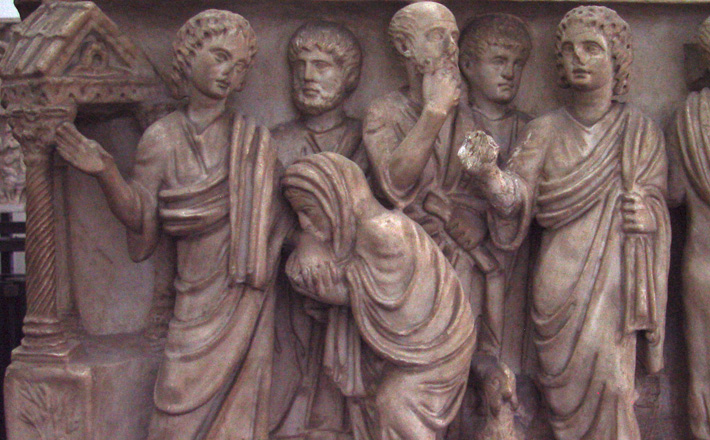Commentary on Hebrews 12:18-29
Today’s second reading is the third of four consecutive readings from Hebrews.
The last two weeks focused on the list of heroes and heroines of the faith in Chapter 11. Today’s lesson compares the worship at Mount Sinai (though the actual place is unnamed in the text) with that of Mount Zion. The arrival to the celestial City of God, much anticipated earlier in this longer section of Hebrews (11:10, 16) is described in some detail. Yet incorporation of the faithful into the “heavenly Jerusalem” and its divine service (12:22) is, in fact, only the penultimate climax of this motif.
Hebrews description of the City of God itself anticipates the stunning exhortation that flows from Hebrews final reflection on the cross: “Jesus suffered outside the city gate in order to sanctify the people by his own blood. Let us then go to him outside the camp and bear the abuse he endured.” Today’s second reading ends by quoting Haggai 2:6 in order to reveal an equally stunning acknowledgement of God’s birthing of a new cosmos, where even the most basic distinction between heaven and earth will be dissolved (12:27). In advance of this cosmic “shaking,” those of faith are asked “to offer God an acceptable worship with reverence and awe” (12:28).
Hebrews’ point seems to be that in a cosmos without such a basic “religious” distinction between heaven and earth, divine service of God necessarily goes “outside the city gate” of even the heavenly Jerusalem to serve those in need. Heavenly worship and responding to the needs of the neighbor are one and the same. The model here, of course, is the incarnation of the pre-existent Word in the person and work of the high priest of this sacred/profane liturgy, Jesus. In short, Christian worship is a liturgy (service) indelibly marked by the cross and the cruciform life of Christian discipleship.
The comparison made between God’s theophanies at Sinai and Zion is fascinating. In a sense, in both revelations God remains hidden, though in different ways. At Sinai, God is hidden in the display of God’s power. Though the description is fearful, it follows rather traditional lines. It includes the display of “darkness and gloom” as well as fire, tempests, and trumpets. Moses himself is led to confess, “I tremble with fear” (verse 21). Animals are to be stoned if they touch the holy mountain. The people themselves beg that “not another word be spoken to them” (verse 19) — an odd request to a God who reveals by speaking (Genesis 1:1; Hebrews 1:1).
On Zion the theophany can also be easily be missed, though in a different way. If on Sinai God is hidden in a fearsome display of divine power, in Jerusalem God’s revelation is hidden in human weakness. Hebrews subtly reflects on this odd, upside-down theophany by returning to the first “hero” of the faith mentioned in Chapter 11 — Abel (11:4). While the spilling of Abel’s blood by Cain revealed the depth of human sin, in the revelation of God on the cross we are drawn “to Jesus, the mediator of a new covenant, and to the sprinkled blood that speaks a better word than the blood of Abel” (12:24). The death of Abel reveals the insidious nature of Sin and the suffering and injustice that flows from it. In the suffering and death of Jesus God speaks a Word that “puts away” Sin (9:26).
Hebrews calls itself “a word of exhortation” (13:22). In this highly sophisticated rhetorical document, words of admonishment are often followed by words of encouragement. Though the text ends with a word of thanksgiving for “receiving a kingdom that cannot be shaken” (12:28), this is preceded by a warning (“do not refuse the one who is speaking,” verse 25), which brings to mind the very beginning of the epistle: “Long ago God spoke to our ancestors in many and various ways by the prophets, but in these last days he has spoken to us by a Son.”
Hebrews notes that the OT records the unwillingness of the people of God to listen when warned by the prophet Moses. How much more is at stake when we are spoken to by God’s very Word? Though God’s voice “shook the earth” (verse 26) in the time of Moses, now God’s voice shakes both earth and heaven. One can read this as a threat, patterned by what is called a minore ad maius — an argument from the lesser to the greater.
If so, the logic is, as the text bluntly puts it, “if they did not escape when they refused the one who warned them on earth, how much less will we escape if we reject the one who warns from heaven!” In other words, the stakes are higher now. The threat of alienation from God is more radical today than “then.” But, more radical than what? Separation from God (cf. 1 Corinthians 10:1-12)? This question leads to others.
What if God’s revelation on Zion is not so simply to be compared with that on Sinai as interpreted through the mechanism of a minore ad maius? What if God’s “way” of speaking in Christ actually bridges the terrifying gap between the all-powerful, transcendent God of fire (and darkness and gloom) and does not widen it?
What if God’s way of speaking in Christ crucified and risen does not lead to the stoning of animals (and people) who are a threat to God holy purity, but is rather “proof” (11:1) of the legitimate faith
• in a God of justice who hears the long suffering cries of innocent blood shed (11:4)?
• in a God of tenderhearted compassion toward mothers whose children who die too young (11:35)?
• in a God of hospitality to homeless wanderers in search of hope and consolation (11:9)?
• in a God of favor to those bound to a life of humiliating shame (11:31)?
What if the Word that God speaks from the cross is such that it is truly heard only when it responds to human need? What if God’s Word simply falls silent when all it is perceived to contain is the threat of holy, transcendent judgment upon all that is impure, unholy, and profane?


August 25, 2013